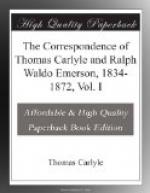Doubt not your new utterances are eagerly waited for here; above all things the “Book” is what I want to see. You might have told me what it was about. We shall see by and by. A man that has discerned somewhat, and knows it for himself, let him speak it out, and thank Heaven. I pray that they do not confuse you by praises; their blame will do no harm at all. Praise is sweet to all men; and yet alas, alas, if the light of one’s own heart go out, bedimmed with poor vapors and sickly false glitterings and flashings, what profit is it! Happier in darkness, in all manner of mere outward darkness, misfortune and neglect, “so that thou canst endure,”—which however one cannot to all lengths. God speed you, my Brother! I hope all good things of you; and wonder whether like Phoebus Apollo you are destined to be a youth forever.—Sterling will be right glad to hear your praises; not unmerited, for he is a man among millions that John of mine, though his perpetual mobility wears me out at times. Did he ever write to you? His latest speculation was that he should and would; but I fancy it is among the clouds again. I hear from him the other day, out of Welsh villages where he passed his boyhood, &c., all in a flow of “lyrical recognition,” hope, faith, and sanguine unrest; I have even some thoughts of returning by Bristol (in a week or so, that must be), and seeing him. The dog has been reviewing me, he says, and it is coming out in the next Westminster! He hates terribly my doctrine of "Silence." As to America and lecturing, I cannot in this torpid condition venture to say one word. Really it is not impossible; and yet lecturing is a thing I shall never grow to like; still less lionizing, Martineau-ing: Ach Gott! My Wife sends a thousand regards; she will never get across the ocean, you must come to her; she was almost dead crossing from Liverpool hither, and declares she will never go to sea for any purpose whatsoever again. Never till next time! My good old Mother is here, my Brother John (home with his Duke from Italy); all send blessings and affection to you and yours. Adieu till I get to London.




